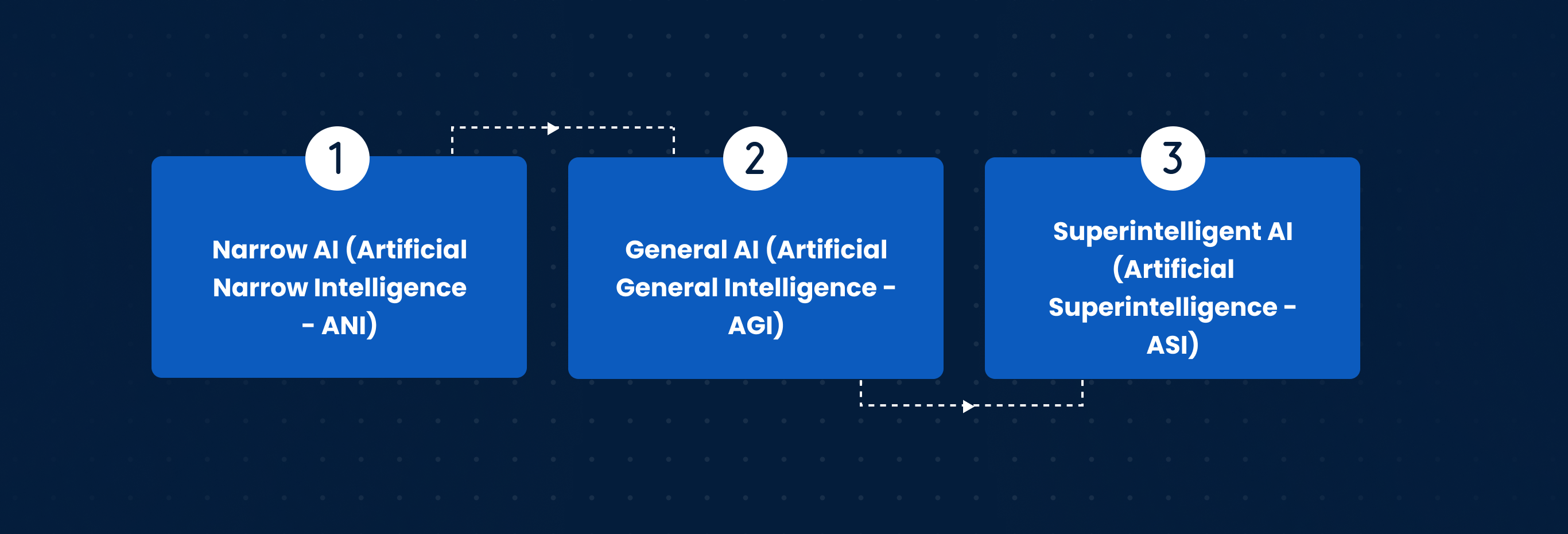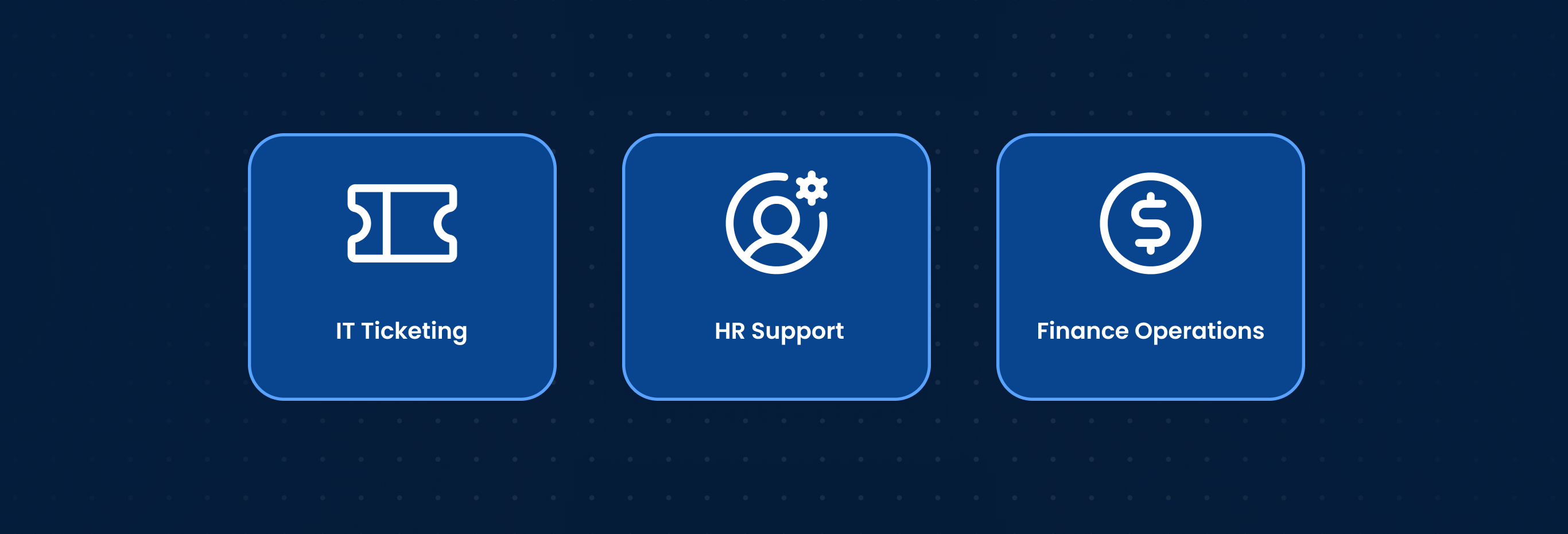Introduction
In the dynamic landscape of 2025, understanding the different types of AI isn’t just academic; it’s a strategic imperative for any technology leader. As CIOs, CTOs, and Technology Heads managing the complex ticketing systems of large US companies, you’re constantly seeking ways to enhance efficiency, empower your workforce, and elevate the employee experience. This guide will demystify the various categories of artificial intelligence, illustrating how each plays a pivotal role in transforming enterprise operations, particularly in IT, HR, and Finance.
Types of AI: A Complete Overview
Artificial intelligence, at its core, refers to machines designed to perform tasks that typically require human intelligence. However, not all AI is created equal. From simple automation to sophisticated decision-making, the capabilities of different types of AI vary significantly. Grasping these distinctions helps you pinpoint where and how AI can deliver the most impactful solutions for your organization. Ultimately, it allows you to build a more resilient and responsive enterprise.
Narrow AI vs. General AI vs. Superintelligent AI
When discussing the types of AI, it’s crucial to categorize them by their scope and capabilities. This foundational understanding helps set realistic expectations and informs strategic planning.
-
Narrow AI (Artificial Narrow Intelligence – ANI): This is the AI we interact with daily. Narrow AI is designed and trained for a specific task or a narrow range of tasks. Think of the AI that recommends movies on a streaming service, detects fraud in financial transactions, or powers the chatbots on your customer service portals. It performs its designated task exceptionally well, often surpassing human capabilities within that specific domain, but it cannot perform outside of it. For instance, a chess-playing AI cannot suddenly write a symphony. Most of the AI solutions transforming enterprise ticketing systems today fall into this category, delivering focused, powerful results in IT, HR, and Finance.
-
General AI (Artificial General Intelligence – AGI): This type of AI would possess human-like cognitive abilities across a wide range of tasks. An AGI could learn any intellectual task that a human being can. It would understand, learn, and apply its intelligence to solve unfamiliar problems, much like a person does. While significant research is underway, true General AI remains largely theoretical and is not yet a reality.
-
Superintelligent AI (Artificial Superintelligence – ASI): This refers to an AI that far surpasses human intelligence in virtually every field, including scientific creativity, general wisdom, and social skills. This level of AI is currently speculative and represents a future possibility rather than a present reality. While it sparks fascinating discussions, our immediate focus for enterprise solutions remains firmly rooted in the practical applications of Narrow AI.

Reactive Machines, Limited Memory, Theory of Mind, and Self-Aware AI
Another way to classify the types of AI is by their functional capabilities and how they process information. This framework provides a deeper insight into the intelligence levels of AI systems.
- Reactive Machines: These are the most basic types of AI. They don’t have memory, meaning they cannot use past experiences to inform future decisions. They simply react to the current situation. A classic example is IBM’s Deep Blue, the chess-playing computer that defeated Garry Kasparov. It could see the board and predict moves, but it couldn’t learn from past games in a broader sense or adapt its strategy over time. These are rule-based systems, offering predictable but limited automation.
- Limited Memory: This class of AI can use past data to make decisions, but only for a short period. Autonomous vehicles, for instance, monitor recent observations like speed, direction of other cars, and traffic lights to navigate. They don’t store a lifetime of driving experience but instead retain enough information to make immediate, informed choices. In enterprise ticketing, this type of AI can learn from recent interactions to improve conversational flow or prioritize tickets based on current trends.
- Theory of Mind: This is a more advanced, still-developing category of AI. It would understand that people have thoughts, feelings, beliefs, and intentions that affect their behavior. This AI would be able to infer human emotions and motivations, leading to more nuanced and empathetic interactions. While not yet fully realized, elements of this are beginning to emerge in sophisticated conversational AI designed to understand user sentiment and intent, thereby improving the employee experience.
- Self-Aware AI: This represents the pinnacle of AI development, where machines would possess consciousness and self-awareness. Like Superintelligent AI, this remains purely theoretical and a subject of intense philosophical and scientific debate. This AI would understand its own internal states and predict the feelings of others, a level of intelligence currently beyond our grasp.
Types of AI Applications in Enterprises (IT, HR, Finance)
The practical application of various types of AI is revolutionizing how large enterprises manage their internal services. In 2025, AI is not just about efficiency; it’s about transforming the entire employee journey.
- IT Ticketing: Here, AI agents are moving beyond basic chatbots to become sophisticated problem-solvers. They can resolve common issues like password resets, software provisioning, and network connectivity problems autonomously. Advanced AI can analyze system logs and user behavior to predict potential outages before they impact productivity. Furthermore, AI-powered intelligent routing ensures that complex tickets are directed to the most appropriate human expert, complete with context and prior troubleshooting steps. This significantly reduces resolution times and frees up IT teams to focus on strategic initiatives.
- HR Support: AI transforms HR from a reactive department into a proactive one. AI agents can answer common employee questions about benefits, policies, time off, and payroll instantly. This frees up HR staff from repetitive queries, allowing them to focus on talent development, employee engagement, and strategic HR planning. Moreover, AI can help onboard new employees by guiding them through forms and information, creating a seamless and welcoming experience. Generative AI can even draft personalized responses to complex HR queries, ensuring consistency and accuracy.
- Finance Operations: In finance, AI enhances efficiency and accuracy. AI agents can assist employees with expense report submissions, provide updates on invoice statuses, and guide them through internal financial processes. AI can also play a crucial role in fraud detection by analyzing transaction patterns and flagging anomalies. By automating routine financial inquiries, AI allows finance teams to dedicate more time to critical analysis, forecasting, and strategic financial management. This improves compliance and reduces operational costs.

Benefits of Understanding Different Types of AI for Businesses
For technology leaders, a clear understanding of the diverse types of AI offers profound strategic advantages. It’s about making informed decisions that drive measurable business outcomes.
- Strategic Investment: Knowing the capabilities and limitations of each AI type helps you avoid overpromising and under-delivering. You can invest in the right AI solutions that align with your specific business challenges and goals, ensuring a strong return on investment.
- Optimized Implementation: Different problems require different AI solutions. For instance, a simple reactive machine might suffice for basic FAQs, while a limited memory AI is essential for personalized conversational experiences. This understanding allows for more effective deployment and integration into existing systems.
- Enhanced Employee Experience: By deploying the appropriate types of AI across IT, HR, and Finance, you can empower employees with instant access to information and resolutions. This not only boosts productivity but also significantly improves employee satisfaction, a critical factor in talent retention.
- Future-Proofing Your Enterprise: The AI landscape is evolving rapidly. By staying abreast of the different AI categories, you position your organization to adopt emerging technologies strategically, ensuring you remain competitive and agile in a constantly changing market.
Future Outlook: How Types of AI Will Shape Enterprises
Looking ahead to the mid-2020s and beyond, the evolution of various types of AI promises to further reshape the enterprise. We’ll see AI becoming even more integrated, intuitive, and indispensable.
The trend is moving decisively from simple AI automation to Agentic AI, autonomous systems that can understand a goal, create a plan, and execute multi-step actions across different applications to achieve it. Imagine an AI that doesn’t just log a ticket for a broken laptop but also checks the employee’s warranty, orders a replacement, schedules a technician, and updates all relevant systems without human intervention. This is the next frontier. Consequently, the convergence of different types of AI, like natural language processing, predictive analytics, and process automation, will create a seamless support fabric. Your future ticketing system will be a proactive, intelligent partner, anticipating employee needs and resolving issues before they even think to ask for help.
How Leena AI Leverages Advanced Types of AI to Transform Workplaces
That future of proactive, autonomous support isn’t a distant dream; it’s happening right now. At Leena AI, we are pioneering the use of Agentic AI to resolve this exact challenge, transforming how employees interact with IT, HR, and Finance departments.
We harness advanced types of AI, specifically built on large language models and integration frameworks, to create AI agents that do more than just talk, they act. Our approach moves beyond the limitations of traditional chatbots that can only answer questions or create tickets.
Consider a common IT request: an employee needs access to a specific software like Salesforce.
-
The Old Way: The employee files a ticket. A level-1 agent sees it, emails the manager for approval, waits, then manually creates another ticket for the provisioning team, who eventually grants access. This process takes days.
-
The Leena AI Way: The employee simply asks our AI Agent, “I need Salesforce access.” The agent understands the request, identifies the employee and their manager, sends an instant approval request on Slack or Teams, and upon approval, uses an API to automatically provision the license in the system. The entire process takes minutes.
This is the power of leveraging sophisticated types of AI for real-world enterprise problems. Our AI Agents are designed to be your best, most efficient employee, one who can resolve up to 70% of IT tickets autonomously, 24/7. By taking on the high-volume, repetitive tasks, we empower your human support teams to focus on the complex, strategic challenges that truly require their expertise. We are not just automating responses; we are automating resolutions.
Frequently Asked Questions (FAQs)
1. What are the most common types of AI used in businesses today?
The most prevalent type is Narrow AI, which is designed for specific tasks. This includes everything from the AI in your email spam filter to the sophisticated AI agents used in modern enterprise ticketing systems for IT and HR support.
2. How do different types of AI impact the employee experience?
Simpler types of AI, like reactive machines, can provide instant answers to basic questions. More advanced forms, like limited memory and generative AI, create personalized, conversational experiences. Agentic AI takes it a step further by autonomously resolving issues, providing a seamless and frustration-free support experience for employees.
3. Is there a security risk with implementing advanced types of AI?
Security is a primary design consideration. Reputable enterprise AI platforms are built with robust security protocols, including data encryption, access controls, and compliance with standards like SOC 2 and GDPR. The goal of these types of AI is to operate securely within your existing IT framework.
4. What is the difference between AI, machine learning, and deep learning?
Artificial Intelligence (AI) is the broad concept of creating intelligent machines. Machine Learning (ML) is a subset of AI where systems learn from data to improve their performance without being explicitly programmed. Deep Learning is a further subset of ML that uses neural networks with many layers to analyze complex patterns, making it a powerful engine behind many advanced types of AI.
5. How can my organization determine the right types of AI for our needs?
Start by identifying your biggest pain points. Are you overwhelmed with repetitive tickets? Is your resolution time too high? For high-volume, process-driven issues, an Agentic AI solution is ideal. For knowledge management, a generative AI-powered search might be best. Understanding your specific goals will help you select the most effective types of AI to deploy.
6. Do all types of AI require massive amounts of data to be effective?
While many types of AI, especially in machine learning, benefit from large datasets, modern approaches like transfer learning and pre-trained models allow for effective implementation with less company-specific data. The key is the quality and relevance of the data, not just the sheer volume.
7. How will the evolution of AI types affect IT and HR jobs?
The evolution of types of AI is not about replacing jobs but augmenting them. By automating routine tasks, AI frees up IT and HR professionals to focus on more strategic, high-value work like system architecture, employee engagement strategy, and complex problem-solving that requires human creativity and empathy.













